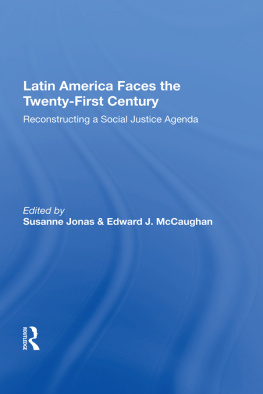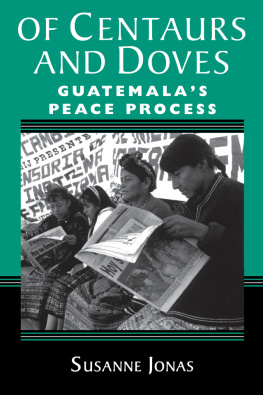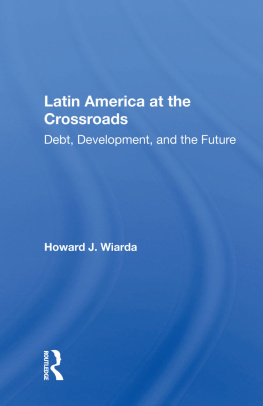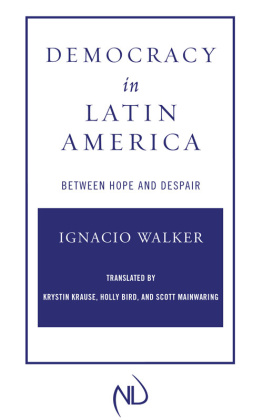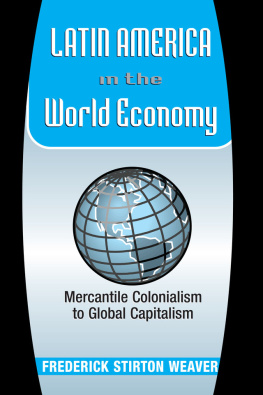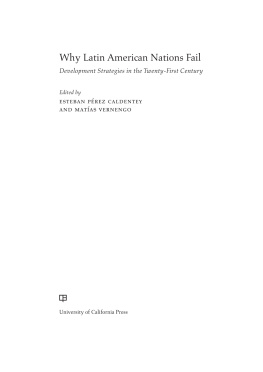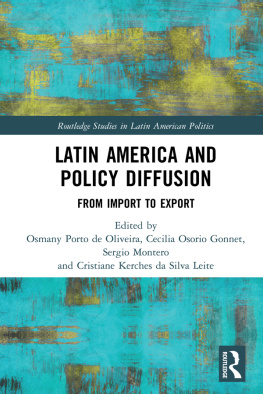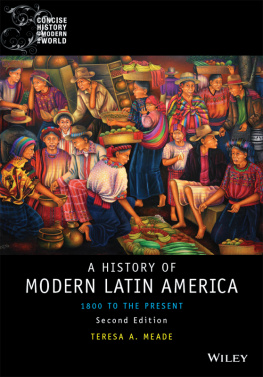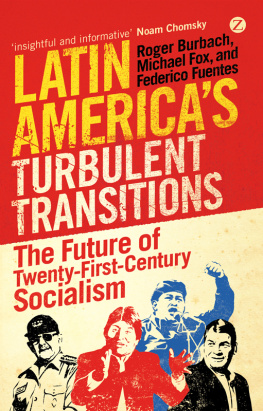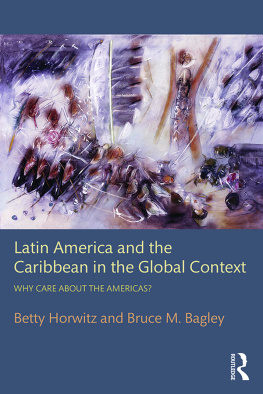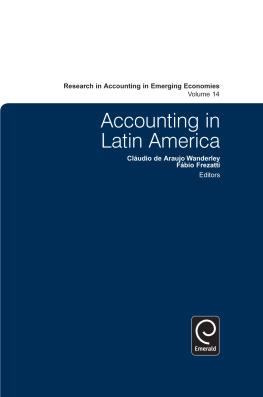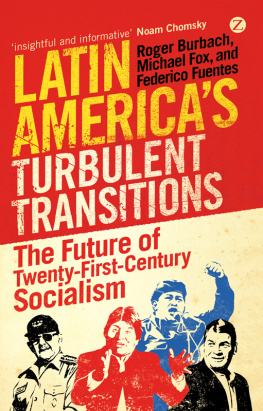First published 1994 by Westview Press
Published 2018 by Routledge
52 Vanderbilt Avenue, New York, NY 10017
2 Park Square, Milton Park, Abingdon, Oxon OX14 4RN
Routledge is an imprint of the Taylor & Francis Group, an informa business
Copyright 1994 by Taylor & Francis
All rights reserved. No part of this book may be reprinted or reproduced or utilised in any form or by any electronic, mechanical, or other means, now known or hereafter invented, including photocopying and recording, or in any information storage or retrieval system, without p ermission in writing fromthe publishers.
Notice:
Product or corporate names may be trademarks or registered trademarks, and are used only for identification and explanation without intent to infringe.
Library of Congress Cataloging-in-Publication Data
Latin America faces the twenty-first century : reconstructing a social
justice agenda I edited by Susanne Jonas and Edward J. McCaughan
p. cm.
Includes index.
ISBN 0-8133-8687-X ISBN 0-8133-8688-8 (pbk.)
1. DemocracyLatin America. 2. Latin AmericaPolitics and
government1980- . 3. Latin AmericaSocial policy. 4. Latin
AmericaEconomic policy. 5. Social justice. I. Jonas, Susanne,
1941 . II. McCaughan, Ed, 1950
JL966.L358 1994
980.039dc20
94-2804
CIP
ISBN 13: 978-0-367-01173-4 (hbk)
Susanne Jonas
W E DEDICATE THIS BOOK TO THE MEMORY OF SEVERAL DEAR L ATIN American friends and compaeros who died in 1991 and 1992Luis Cardoza y Aragn, Agustn Cueva, Csar Jerez, and Gregorio Selserand in tribute to 1992 Nobel Laureate Rigoberta Mench, one of Latin Americas outstanding women, also a dear friend and compaera. Since the written works of our late colleagues are, by and large, not available in English, it seems especially fitting to memorialize them in this book, one of whose main goals is to make available the best Latin American analyses to English-language readers. In any case, we wish our readers to know about these giants of Latin American intellectual and cultural life.
Luis Cardoza y Aragn was one of the leading Guatemalan and Latin American writers of the 20th century. He was a founding father of Guatemalas cultural life during that countrys ten years of spring, the 19441954 democratic Revolution. He lived in exile in Mexico ever since the CIAs 1954 intervention ended that brief spring. The magic of indigenous Guatemala was revealed to the world through Luis voluminous works of literature and analysis, among them, La revolucin guatemalteca ( 1955), Guatemala: Las lineas de su mano (1965), El Rio (1986), Miguel Angel Asturias, casi novela (1991), as well as innumerable essays. I met Luis almost the first time I went to Mexico, in 1967, and from then on never made a trip to Mexico without passing at least one wonderful afternoon with Luis and (until her death in 1988) his wife Lya in their house in Coyoacn. Luis has accompanied me during these many years of writing about Guatemala, always a source of inspiration and of challenge to my assumptions when they were too easy. I last saw Luis in August of 1992, a short week before his death; even on his sickbed at the age of 88, this Guatemalan brujo (or sorcerer) was lucid, precise, razor-sharp, and passionately caring as ever, as we ranged in one hour from Guatemala to the crisis in Cuba to the new world order to the health of mutual friends. As I left, his last words deflected attention from himself: Youre looking very well, I see. Mexico will never be the same for me without those afternoons with Luis.
Agustn Cueva, Ecuadorian by birth, also lived most of his adult life in Mexico. He was central to the intellectual community that has made Mexico our hemispheres Paris and to the uniquely Latin American analysis of Latin America and the world. Continentwide, Agustns work has been regarded as a point of reference; he has taught and inspired an entire generation of Latin American sociologists to think critically, through his many books and critical essays El desarrollo del capitalismo en America Latina (1977), Las democracias restrngidas de America Latina (1988), and America Latina en lafrontera de los aos 90 (1989) to mention only a few. He was also a great teacher. I remember a 1988 Congress of Central American Sociologists in Guatemala, where hundreds of university students were awakened from decades of military dictatorship and intellectual self-censorship by Agustns electrifying critique of the rightward trend sweeping Latin American sociology. Even in his last year, he remained ever the critic, ever the defender and teacher of a Latin American viewpoint, a central figure at several international conferences. For me, Agustn was also a close friend since the late 1970s. However firm in his beliefs, he was always gracious, warm, respectful, and modest. Just before he moved back to his native Ecuador, where he died a few months later in May 1992,1 went to see him in Mexico, knowing it would be for the last time. I had asked him for an article for this book, which he promised to try to send; but mainly, I wanted to thank him for all he had given over the years to me and to so many others of my generation.
Father Csar Jerez, like Luis Cardoza y Aragn, was a Guatemalan who spent much of his productive life outside his native country. I first knew him as head of the community of Jesuits working among the popular classes in Guatemala Citys impoverished Zone 5 in the early 1970s. As Guatemala moved toward its second wave of civil war in the mid-1970s, Csar worked among the poor in his native village, quickly coming to be feared by the army and the rich. He was falsely accused of using grass-roots organizing after the 1976 earthquake to bring arms into the community; in reality, he was accused of fulfilling a Christian option to serve the poor. He spent the rest of his life in other Central American countriesfrom 1976 to 1982, as head of the Jesuit regional organization, in El Salvador, during the early years of that countrys civil war; and the rest of the 1980s in Nicaragua, where he served as Rector of the Universidad Centroamericana, bringing to bear all of his own academic training and practical experience. Two years after the November 1989 assassination of Ignacio Ellacura in El Salvador, Csar was to have taken Ellacuras place as Rector of El Salvadors Universidad Centroamericana, when he suddenly died during a visit to Colombia. Internationally, Csar is known largely for his work in Nicaragua during the Sandinista Revolution, which he carried out with unequaled skill, distinction, and passion. Yet I also knew him, and history will also know him, as a Guatemalan. Ever patient, ever hopeful as we talked yearly in his office at UCA (generally between seven and nine a.m.), he unraveled for me many great secrets of Guatemalas social upheaval. Even from abroad, he was instrumental in moving the Guatemalan Church toward breaking through the wall of silence in articulating what he called the grito desde adentro , the cry of the people.

